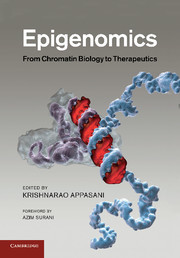Epigenomics From Chromatin Biology to Therapeutics
Langue : Anglais
Coordonnateur : Appasani Krishnarao
Préfacier : Surani Azim

Experts from academia and both the biotechnology and pharmaceutical industries introduce biological, medical and methodological aspects of the emerging field of epigenomics.
Understanding mechanisms of gene regulation that are independent of the DNA sequence itself - epigenetics - has the potential to overthrow long-held views on central topics in biology, such as the biology of disease or the evolution of species. High throughput technologies reveal epigenetic mechanisms at a genome-wide level, giving rise to epigenomics as a new discipline with a distinct set of research questions and methods. Leading experts from academia, the biotechnology and pharmaceutical industries explain the role of epigenomics in a wide range of contexts, covering basic chromatin biology, imprinting at a genome-wide level, and epigenomics in disease biology and epidemiology. Details on assays and sequencing technology serve as an up-to-date overview of the available technological tool kit. A reliable guide for newcomers to the field as well as experienced scientists, this is a unique resource for anyone interested in applying the power of twenty-first-century genomics to epigenetic studies.
List of contributors; Foreword; Preface; Part I. Basics of Chromatin Biology and Biochemistry: 1. Introduction to epigenomics; 2. Epigenetics and its historical perspectives; 3. Functional networks of human epigenetic factors; 4. Nucleosome positioning in promoters: significance and open questions; 5. Chemical reporters of protein methylation and acetylation; 6. Long non-coding RNA in epigenetic gene silencing; Part II. Epigenomic Imprinting and Stem Cells: 7. Active DNA demethylation - the enigma starts in the zygote; 8. Histone modifications of lineage specific genes in human embryonic stem cells during in vitro differentiation; 9. Epigenetic stability of human pluripotent stem cells; 10. Impact of CpG methylation in addressing adipose derived stem cell differentiation towards the cardiac phenotype; 11. Regulation of stem cell epigenome by REST; 12. MicroRNAs in embryonic stem cells; 13. Regulation of timing of replication; Part III. Epigenomic Assays and Sequencing Technology: 14. Detection of CpG methylation patterns by affinity capture methods; 15. Genome-wide ChIP-DSL profiling of promoter methylation patterns associated with cancer and stem cell differentiation; 16. Quantitative, high-resolution CpG methylation assays on the pyrosequencing platform; 17. DNA methylation profiling using Illumina BeadArray platform; 18. Advances in capillary electrophoresis-based methods for DNA methylation analysis; 19. Genome-wide methylome analysis based on new HT sequencing technology; 20. 3-D quantitative DNA methylation imaging for chromatin texture analysis in pharmacoepigenomics and toxicoepigenomics; Part IV. Epigenomics in Disease Biology: 21. Cancer classification by genome-wide and quantitative DNA methylation analyses; 22. Promoter CpG island methylation in colorectal cancer: biology and clinical applications; 23. The epigenetic profile of bladder cancer; 24. Genome-scale DNA methylation analyses of cancer in children; 25. The epigenetics of facioscapulohumeral muscular dystrophy; 26. Modulating histone acetylation with inhibitors and activators; Part V. Epigenomics in Neurodegenerative Diseases: 27. Study design considerations in epigenetic studies of neuropsychiatric disease; 28. Epigenetic regulation in human neurodevelopmental disorders including autism, Rett syndrome and epilepsy; 29. The neurobiology of chromatin-associated mechanisms in the context of psychosis and mood spectrum disorders; 30. Genome-wide DNA methylation analysis in patients with familial ATR-X mental retardation syndrome; 31. Kinases and phosphatases in the epigenetic regulation of cognitive functions; Part VI. Epigenetic Variation, Polymorphism and Epidemiological Perspectives: 32. Epigenetic effects of childhood abuse on the human brain; 33. X-linked expressed SNPs and dosage compensation; 34. Epigenomic diversity of colorectal cancer; 35. Epigenetic epidemiology: transgenerational responses to the environment; Index.
Krishnarao Appasani is the Founder and Chief Executive Officer of GeneExpression Systems, a conference producing organization focusing on Biomedical and Physical Sciences. He is editor of MicroRNAs: From Basic Science to Disease Biology (2007) and RNA Interference: From Basic Science to Drug Development (2005), also published by Cambridge University Press.
Date de parution : 07-2014
Ouvrage de 574 p.
17x24.4 cm
Date de parution : 08-2012
Ouvrage de 548 p.
17.5x25.3 cm
Thème d’Epigenomics :
© 2024 LAVOISIER S.A.S.



